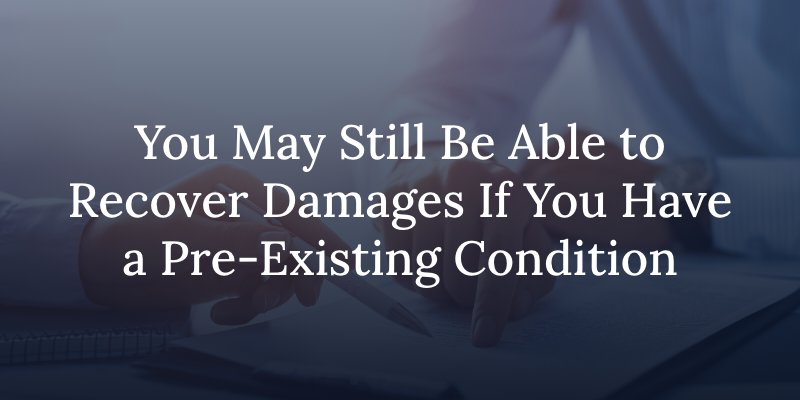Can a Pre-Existing Condition Affect My Personal Injury Claim?
A pre-existing condition can affect your personal injury claim, but it does not necessarily prevent you from recovering damages.
The Eggshell Plaintiff Doctrine
The “eggshell plaintiff” rule states that the defendant must take the plaintiff as they find them. This means that if you have a pre-existing condition that makes you more susceptible to injury, the defendant is still liable for the full extent of the injuries they caused, even if those injuries are more severe due to your pre-existing condition.
However, if you cannot establish that the accident caused a new injury or exacerbated your pre-existing condition, you may not be able to recover damages. The burden of proof is on you to show that the defendant’s actions directly led to your current health issues.
Causation and Apportionment
A key issue in personal injury cases involving pre-existing conditions is determining causation. You must show that the defendant’s actions caused the new injury or exacerbated your pre-existing condition. Courts may apportion damages between the pre-existing condition and the new injury if the evidence supports such a division.
In cases where it is determined that only a portion of your injury or condition is attributable to the accident, damages may be apportioned accordingly. This means you may only receive compensation for the part of your condition that was worsened by the accident, not for the underlying condition itself.
Aggravation of Pre-Existing Conditions
If the injury aggravates a pre-existing condition, you can seek compensation for the exacerbation. Medical expert testimony often plays a crucial role in distinguishing between pre-existing conditions and injuries caused or worsened by the accident.
If the evidence shows that the pre-existing condition was not aggravated by the accident, you may not be able to claim compensation for it. For instance, if you had a pre-existing knee injury and the accident did not worsen it, you cannot claim damages for that injury.
Medical Records and Documentation
Your medical records will be critical in proving your case. They will help demonstrate the extent of your pre-existing condition prior to the injury and the impact of the new injury. Consistent and thorough documentation from your healthcare providers is essential.

Insurance Adjusters and Defense Tactics
Insurance adjusters and defense attorneys may attempt to minimize your claim by attributing your injuries solely to your pre-existing condition. They may argue that the damages are due to your health issues rather than the accident. This is why clear medical evidence and expert testimony are vital.
If the defendant can successfully argue that your current symptoms or condition are solely the result of a pre-existing issue and not related to the accident, you may not receive compensation for those symptoms or conditions.
Legal Representation
Having an experienced Tacoma personal injury lawyer is crucial. They can help navigate the complexities of cases involving pre-existing conditions, gather necessary medical evidence, and counter-defense strategies aimed at reducing your compensation.
Contact Brumley Law Firm
While a pre-existing condition can complicate a personal injury claim, it does not automatically disqualify you from obtaining compensation. Proper documentation, legal support, and expert testimony can be important in presenting your claim and seeking appropriate compensation under the law.
Take the first step towards justice and peace of mind. Contact Brumley Law Firm today for a free consultation. Let us help you secure the compensation you need to move forward. Get in touch with us at (833) 832-2727, or using our online form to schedule your appointment. Your health and future are too important to wait. Reach out to Brumley Law Firm today.